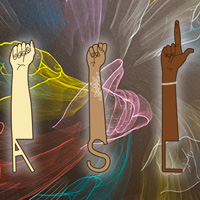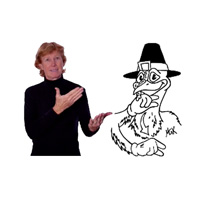Articles by BRENDA CARTWRIGHT
Signs That Are Close... But Not the Same — Introductions
This article is part of our “Signs That Are Close... But Not the Same” series, which highlights signs that look similar, but have different meanings. The signs discussed in this article include (1) Name vs. Weight, (2) I vs. You, (3) You / He / Her vs. Your / His / Hers (4) Your vs. My, (5) My / Mine vs. I / Me, (6) Deaf vs. Dorm vs. Home vs. Native American, (7) Good vs. Bad, (8) No vs. 20 vs. Duck vs. Chicken, and (9) Meet (as in “I met”) vs. Meet (as in “meet me”) vs. Meet (as in “they met”) vs. MEET (as in, "to meet many people").
8 Myths About Deaf People
Are you interested to learn more about deaf people, and to gain clarity on some common misperceptions? Read on to get insight on how 8 myths about deaf people are debunked.
Historic Academy Awards for the Movie CODA and its Cast and Crew
The movie CODA was nominated for three Academy Awards and won in each of those three categories! Read further to learn more about these historic wins for a movie featuring deaf actors.
Does it matter which hand I sign with? Using Your Dominant Hand When Signing
Are you a new learner to signing and wondering which hand you should use ... especially if you are left-handed? Read on to discover tips on choosing which hand should be your "dominant hand" for signing.
Do deaf people drive?
Have you ever wondered about deaf people driving automobiles? Read the article for the answer and a better understanding.
What is American Sign Language (ASL)?
American Sign Language (ASL) is a full, natural language that has developed through use. Read the article to learn more about ASLs complex and interesting characteristics and its relationship to Deaf culture.
Signs That Are Close... But Not the Same - Alphabet
This article is part of our “Signs That Are Close... But Not the Same” series, which highlights signs that look similar, but have different meanings. The signs discussed in this article are all from the alphabet: (1) A vs. S vs. T, (2) A vs. E, (3) E vs. O vs. C, (4) P vs. K, (5) 1 vs. D vs. K, (6) G vs. H vs. Q vs. U vs. N, (7) N vs. M, (8) R vs. U, and (9) J vs. Z
Living Loud: I. King Jordan - First Deaf President of Gallaudet University
After a historical protest, I. King Jordan was named the 1st deaf president of the only liberal arts university for deaf students, Gallaudet University.
Living Loud: Linda Bove - Actress and Activist
As an actor on Sesame Street, Linda Bove had the longest-recurring role in television history for a deaf actor. Her influence helped many around the world take an interest in sign language and learn more about Deaf culture.

















